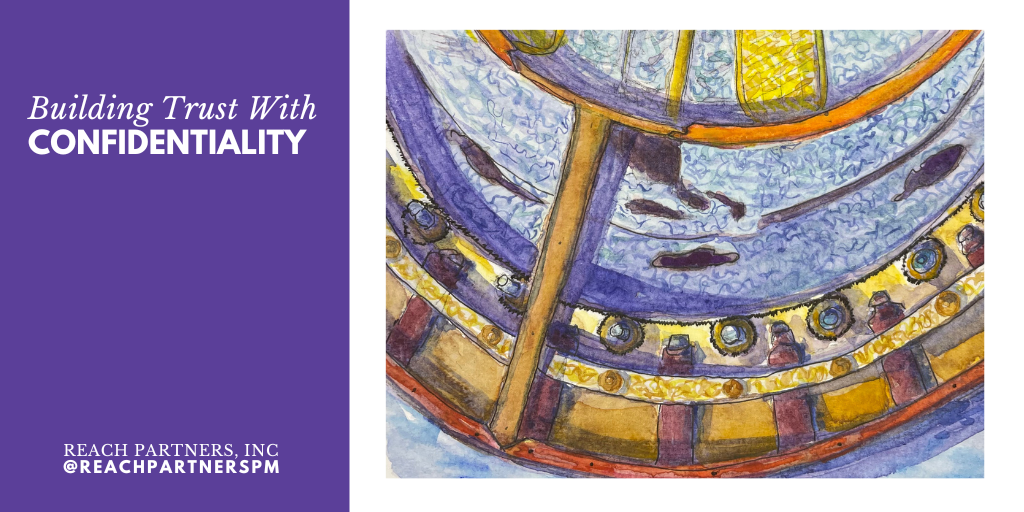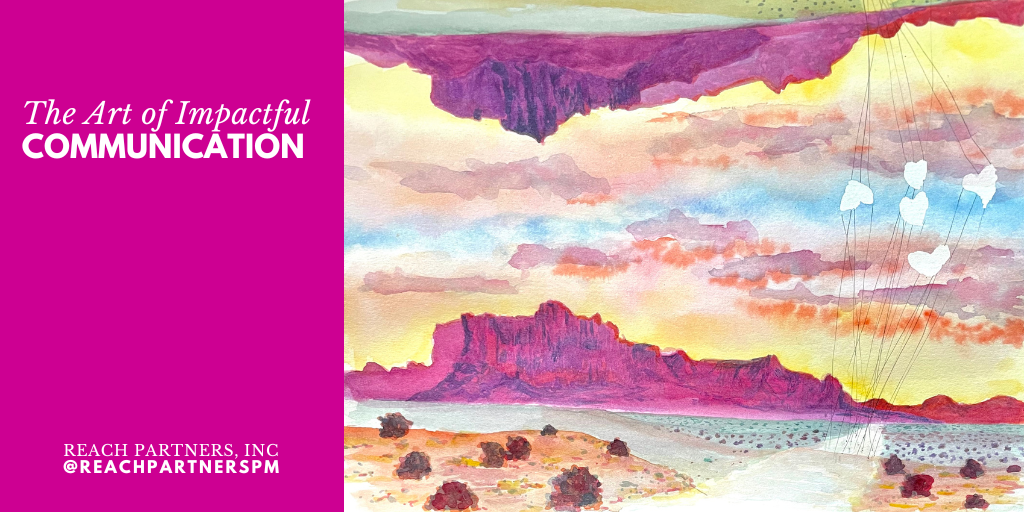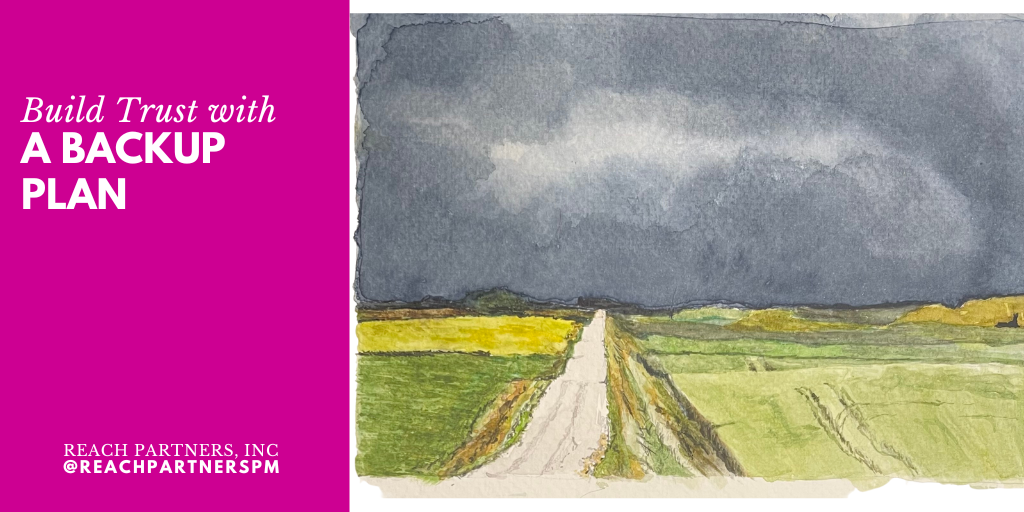|
Whenever two or more people meet in an office, conference room, or workspace, issues may arise. After all, differing opinions are a side effect of being human.
To prevent something small from shifting into a serious problem, we’ve learned at Reach Partners that open discussion can benefit the productivity of our team. Addressing small and large matters early on can lead to a healthier organizational culture. As much as we like each other, Anita and I acknowledge and accept we’ll have challenges working together. To address these, we keep “issues” as a weekly agenda item at our staff meetings. By giving ourselves a consistent time and place for the conversation, we can prepare for dialogue instead of argument. This allows us to focus our work time on client projects instead of stewing over issues. It is one way we value each other, deflate disagreements, and take action to move forward.
0 Comments
I started running just before I turned 30. After realizing I had never completed a consecutive mile, I wanted to see if I could reduce the amount I sweat (my cooling system is a slick thing to be admired) and transform into a long-legged, running gazelle (nope).
Still, what I have discovered after years of trotting is there are similarities between running a race (like a half marathon, 13.1 miles) and the project management work I do at Reach Partners (everyday, baby). For both, success starts by committing to do what I say I’ll do. We recently decided to update our client testimonials and debated whether omitting a client name made the testimonial useful. The discussion was particularly valuable because it led to a deeper dialogue about the link between confidentiality and trust.
Trust is the basis of all successful relationships. Among the various elements that foster trust, confidentiality stands out as a crucial component, especially when partnered with integrity. Our commitment to respecting client confidentiality isn't just a box we check off — it's the cornerstone of how we build and maintain strong relationships. There are moments when something as mundane as a well-crafted email evokes awe. Call me a communication nerd, but I'm on a daily quest to master this art.
A beautifully composed email with a simple layout? Delivered in advance, and it’s structured with information in order of importance? That's my kind of joy. I appreciate it when someone invests time and resources to plan their communications. You can tell when they do. They bundle messages and write one email, not two or three. They organize information, prioritizing my attention and action over their convenience. Best of all, they strategically exclude information that doesn’t pertain to me. In the moments before the launch of an event or project, I’ve heard Anita repeat a sort of pep talk with the team at hand. It always comes during the inevitable scramble that occurs as a project comes to fruition.
During this speech she reiterates the purpose of the activity, project, or event. She also tells the team that she’s intentionally pausing on politeness during this last-minute crunch. From that moment until everything is running on its own, the team will not hear Anita say please or thank you. This speech marks a moment of distinction when the project transitions from planning to execution, when the team moves from preparing to doing. At this moment, Anita shifts her role from relationship manager to focused executor. Declaring this small, but philosophically significant juncture, gives her the critical permission to “go,” and signals the team to do the same. How do you typically respond to conflict?
This may not be a question we are comfortable answering, but understanding the primary way you respond to conflict can help you become more aware of your tendencies. It also can help you make better choices when you don’t agree with someone. Whether it's a disagreement with a colleague at work, a misunderstanding with a friend, or a difference of opinion within family, conflicts are a natural and inevitable part of human interaction. How we handle them significantly impacts our relationships and overall well-being. After completing a post activity report (PAR) for a recent project, Anita and I discussed the wisdom of having a backup plan.
Yes, we complete a PAR for every project, which we talk about more here. But this post is really about dealing with yet another winter storm this long winter, and the plan we created to mitigate the risk of weather. Creating a backup plan extends our strategic approach for achieving our client’s goal, which is our most important goal. ’Tis the season for one more thing – one more cookie, one more gathering, one more decoration, gift, or craft.
It’s tough being human. We have a lot of wants to manage in a mere 24 hours. In a season of lots of wants, we get to navigate our priorities to help us make decisions. How do we do it? When times and projects are rough, we have some advice: grab chocolate and a project manager.
It’s likely not surprising to you that we would recommend a project manager. The chocolate might be a bigger mystery. But eating chocolate (or another favorite treat) is one of the many ways leaders can ground themselves amid stress. In recognition of this, here are three ways you can mitigate panic and stress when projects go awry. The following is good counsel for all of us. It’s an especially busy time for Anita and me. We hear it’s the same for our clients, trusted vendors and friends. While I write this for you, the advice is really for me. All it takes are five simple ingredients to add creamy flavor to fried potatoes and punch to baked salmon. Those same five ingredients can serve as a base for a scrummy potato salad and the unsung heroes of a BLT sandwich.
When you combine garlic, mustard, egg, oil and lemon, you get an unforgettable garlicky mayonnaise, also known as aioli. Those individual ingredients are certainly tasty, but they become magical when combined. By slowly adding oil while whipping the other ingredients, the liquids emulsify and create a custard-like spread. Yum! Like mayo, the ingredients for a planning process are simple. Yet they form something new when combined. When blended, purpose, people, time, communication, and action become key ingredients to projects, events and collaborations we deem successful. |
Reach PartnersYour partners in leadership. Categories
All
Archives
July 2024
|
|
|
Reach Partners, Inc
3330 Fiechtner Dr. Suite 100 Fargo, ND 58103-2321 701-271-8170 Copyright (C) 2024 Reach Partners Inc.
|










